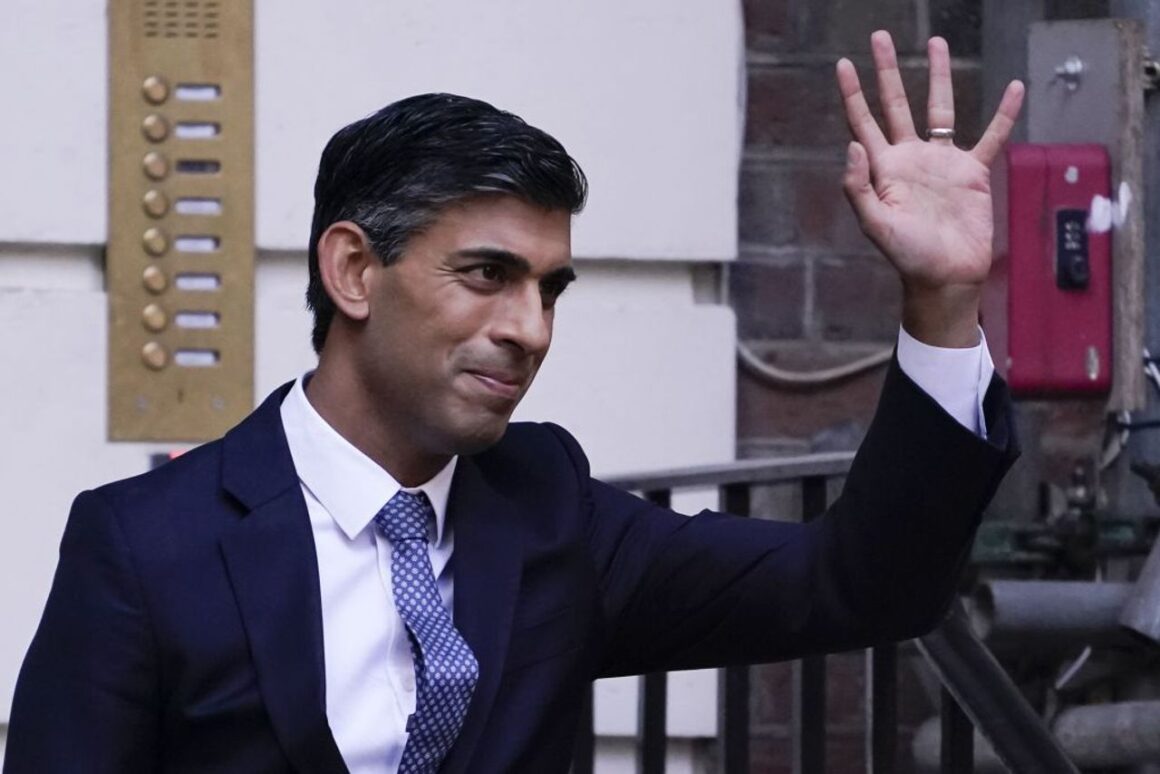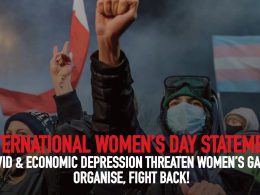By Tom Costello, Socialist Alternative (our sister organisation in England, Wales and Scotland)
First, the Queen dies. Then a ‘mini-budget’ pushes the British economy to the brink of collapse. Then, just after the Tories come within an inch of reinstalling Boris Johnson as Prime Minister, back comes Rishi Sunak to the front again.
Four people have held the post of Prime Minister over the previous five years — three of those over just seven weeks. While the coronation of Sunak has temporarily stabilised the markets by throwing together his ‘unity cabinet’, further ruptures and points of tension are bound to come to boiling point over the coming months.
An era-defining humiliation
“It has been a night of astonishing scenes at Westminster with reports of jostling, manhandling, bullying and shouting outside the parliamentary lobbies in a supposed vote of confidence in the government.
The deputy chief whip was reported to have left the scene saying, “I’m absolutely F-ing furious, I just don’t F-ing care any more”, before he resigned along with the chief whip. But we’ve just been told they have now officially unresigned. The home secretary has, however, definitely gone. In short it is total absolute abject chaos.”
These were the words of ITV newsreader Tom Bradby on 20 October. Just hours later, Liz Truss had resigned, sacked by her own MPs. The race for a new Prime Minister began.
Truss’s 49 days in office which the country endured has already gone down in history as one of the deepest political disasters for the Tory party in history. As she was sacked, polls spoke the loudest: 80% openly disliked Truss, compared to a mere 10% who still gave their support.
This period has been universally recognised — including by the Tories themselves — as an unmitigated disaster for their system. The mini-budget introduced in late September threw the financial sector into freefall. Panicked investors withdrew their investments from UK companies out of sheer terror as they saw a budget made up of a contradictory mix of heavy unfunded tax cuts for the super-rich, combined with record-high state spending and heavy public debt. Only a massive injection of credit from the Bank of England was able to fend off a financial collapse, with pension funds on the brink of bankruptcy and the pound plummeting.
Then came the palace coup. After Hunt was installed as Chancellor, he ripped up the entire platform Truss had stood on. As the final act of humiliation, Sunak was summoned back to restore ‘stability’ to the markets and reassert the Tories’ willingness to play the game by the rules set by the Bank of England and the IMF.
The markets have temporarily calmed and the ruling class has clearly taken something of a breather. ‘Give Rishi a chance’ is most likely their mantra over the coming weeks. But behind the catastrophe of Truss is big business’s growing exhaustion with the Tories. In reality, since the Brexit crisis the Tory Party has become increasingly Trumpified. The party of ‘reliable’ politicians of the Cameron era has given way to a band of attention seeking egotists like Johnson and Truss. The result has been a series of calamities for investors and bankers. By crashing the pound after ignoring ‘professional advice’, the bosses faced humiliation not just in Britain, but globally.
The Tories and their buddies in big business and finance still retain delusions of Britain carrying ‘clout’ and ‘influence’ on a world scale, with delusional nostalgia for the Empire. Even though Britain has long been a declining imperialist power, the budget, by smashing confidence in the economy has seen Britain’s international standing bumped even further down the pecking order, with economists like Larry Summers likening UK market behaviour to an “emerging… submerging economy”.
For the IMF to step in and give a lecture to the government in much the same way that they would to neo-colonial countries severely tarnishes a ruling class who are betting their future on their ability to buddy up with Biden and the US in the new US-China Cold War. The dream of a ‘Global Britain’ after Brexit is crumbling right in front of their eyes.
This reflects a crisis of global proportions — a world crisis of multifaceted, interlinked points of disruption in a fractious, deglobalising world. However, the attempt of Truss to hide behind this, to paint Britain’s shipwreck as being solely a product of ‘Vladimir Putin’s invasion of Ukraine’ turned her into a laughing stock. British capitalism’s malaise is particularly intense when compared to the rest of the advanced capitalist countries. Its reputation as the ‘Sick Man of Europe’ has come back with a vengeance.
What this means for Britain’s ‘global standing’ is a total embarrassment for the establishment which they won’t be prepared to repeat. If needed, they will be equally prepared to turn against Sunak if he makes similar missteps, which is quite possible given his already poor record.
Divided ruling class
Behind the political chaos and ferment is the basic fact that the capitalists agree on only one thing — to maintain high profit margins at the expense of working class living standards. Everything else, including how to actually implement a workable policy that will cut into wages and benefits is open to question.
Truss’ hardline libertarian policy had been challenged by the bulk of the ruling class. This attempt of a small and shady layer of hard-right neoliberal think tanks to push through a policy of ultra-low taxes and a small state, re-enacting fantasies of the Thatcher era, collided with reality.
In order to swim against the stream of ‘market orthodoxy’, Truss had to bypass the established channels of decision making, such as the Office for Budget Responsibility. A tug of war opened up. In reality, for a whole period, two parallel governments sprung into existence, embodying totally opposite economic approaches. By contrast with Kwarteng’s ‘slash and burn and hope the pie grows’ mantra, the Bank of England elected to hike up interest rates to curb inflation. Although held up by the bosses as a safer and more ‘sensible’ approach, what this amounts to is a concerted effort by the financial institutions to offload the crisis onto the backs of working class people — just in a different way to how Truss and Kwarteng saw: by provoking a recession to ‘cool’ activity and tame inflation, thereby creating rising unemployment and further impoverishment.
But British capitalism over previous decades has suffered from the terminal problem of ‘underinvestment’. To avoid risk, companies choose not to invest in production and instead rely on depressed wages to ensure profits. Historically cheap credit and loose monetary policy has resulted in the creation of ‘zombie companies’ — mega-corporations dependent on ‘easy money’ provided by the Bank of England’s ‘Quantitative Easing’ Programme — which has now juddered to a halt. The interest rate hikes now underway make it harder to lend and borrow and will now usher in a period of deep and prolonged recession, meaning a wave of closures and insolvencies which the capitalists would struggle to tackle. An ensuing crisis in the housing market will be an unmitigated disaster for ordinary working people (and many middle-class people) renting or on mortgages — all while the vulturous and parasitic property tycoons rake in their billions.
Now, even with the figure of ‘unity’ Sunak taking the reins (for however long we will see!), a more pliable representative of business interests will not solve the problems of the market by tinkering around the edges. The problems are baked into the very nature of this chaotic, inhumane system which makes working class people and the majority pay for the crimes of the super-rich elite.
Sunak serves a racist system
The Daily Mail has hailed Sunak’s coronation as a “new dawn for Britain”. The UK media has in particular gone to town in emphasising the historic moment of Britan gaining its first non-white Prime Minister. But this is no ‘step forward’ for the vast majority of non-white working class people in Britain. Black and brown people, who are still often subject to double oppression on the basis of race and class exploitation, will gain nothing from this out-and-out representative of the system.
As Seattle Socialist Alternative councilmember Kshama Sawant put it best:
“Celebrating Sunak for his South Asian ethnicity is akin to praising Margaret Thatcher for having been a woman Prime Minister. Just like Thatcher was, Sunak is a ruthless representative of the billionaire class, not of working women, people of colour, or immigrants. With a net worth over £730 million, Sunak is extremely wealthy. His wife, Akshata Murty, is the daughter of an Indian billionaire. Sunak was revealed, only a few months ago, to have used his wife’s non-domicile tax status to avoid up to £20 million in taxes.”
Sunak has shown how this government will be just as much a culture-war government as Johnson’s. Kemi Badenoch, a candidate of the hard-right who has led on a hardcore anti-trans, anti-’woke’ platform, is now ‘Equalities’ Minister. Suella Braverman, who said in September that she “dreams” of front-page headlines of sending deportees to Rwanda as Home Secretary.
The anti-working class measures — anti-union laws, and attacks on living standards — will not serve the interests of black and brown people. Only a movement of the working class prepared to challenge systemic racism will do that.
A general election is needed — but no pause in the struggle!
Contempt for democratic rights goes right to the top of the Tory Party and establishment. Liz Truss became Prime Minister on the basis of 81,000 (hard-right) votes. Worse still, Sunak is an unelected head of government, appointed by an unelected head of state in the monarchy.
It is of course no surprise that Sunak has rejected popular demands for a general election. Barring an unforeseeable event, the Tories look likely to lose the next general election whenever it is held. On 16 October, just before Truss’ resignation, Labour were predicted to win 411 seats. The Tories are set to lose 219, down to 139. Were this to happen, Rees-Mogg, Hunt, Johnson and Coffey, along with all 45 of the ‘Red Wall’ MPs would lose their seats. Although Sunak will hope to claw back some of this for a period, any misstep similar to the Johnson-era scandals around Covid, tax avoidance and lockdown parties (which is quite likely) or introducing any deeply unpopular policies including hardline austerity will send the Tories’ electoral prospects tumbling again.
The Tories need to be driven out, and driven out fast. Socialist Alternative says that the strikes currently underway should link up in raising the bold slogan for a general strike to force a general election — not in 2024 but NOW! No to an undemocratic, unelected Prime Minister heading an unelected government!
Millions of working class and young people, come the next election, will be prepared to cast a vote for Labour, not out of deep enthusiasm for Starmer’s hollow neo-Blairism, but to strike a blow at the Tories and bring an end to their 12 years of catastrophic rule. Although this would certainly mark a step forward and an opportunity for workers to fight back, it would be a serious mistake to pause the struggle under the guise of ‘giving Labour a chance’. In the event of an election, the workers movement will need to urgently discuss the reality that Labour is a pro-capitalist party, not a pro-worker party.
The unfortunate reality is that Starmer, although certainly not the same kind of rotten right-wing monster as Sunak, is loyal to the needs of capitalism not the needs of the masses, and will deliver reforms which benefit the majority only insofar as he is compelled to do so by massive pressure. The strikes will need to continue unabated, escalated and with clear demands to be placed on any future Labour government.
Starmer’s approach since winning the leadership of the party in 2020 (on the basis of falsely identifying as ‘left’), has been to utterly overturn the Corbyn era and remake the party in the image of big business. Ripping whole chapters out the playbook of Tony Blair’s New Labour, he has sent repeated overtures to the rich that Labour will be a safe haven — a reliable second pair of hands for the system. Beyond a smattering of isolated MPs and councillors, Starmer has been entirely successful in undemocratically purging the last vestiges of the campaigning, left-wing, anti-austerity movement around Corbyn. Business as usual is the order of the day under Sir Keir the former Crown Prosecutor.
Following Labour’s recent conference, at which ‘God Save the King’ was sung under a backdrop of a giant Union Jack (the perfect overture to the establishment that Labour is safe for big business again), Starmer commented: “What you saw in our conference was a changed Labour party. [There were] not just the Labour party members and activists, but lots of people there from the media and businesspeople”.
Starmer’s Shadow Chancellor Rachel Reeves has in particular pitched to industry that Labour will be the party of “sound money”. Jess Phillips even hinted the other week that several key promises for higher investment may have to be ditched by a Labour government if they have to make similar so-called “tough decisions” to the ones Hunt will force on us.
The strategy for Starmer of currying favour with the rich has already seen some results. Although Sunak may temporarily cut across this process, under Truss’ premiership big business already significantly warmed towards Labour. John Allan, chair of Tesco, former head of both the Confederation of British Industry and a former Royal Mail director, spoke recently of Labour’s “plausible” and “attractive growth plan”. A wider shift of allegiance from the British ruling class from the Tories to Labour could well be on the cards over coming months depending on how well Sunak cobbles together a functioning government.
Socialist Alternative says that the real force for change will be in working class people organising themselves and taking action — through strikes, protests, demonstrations and community organising. The workers’ movement also needs a political voice. Under a Starmer-led Labour government, the need for a new left-wing party based on the developing class struggle will be placed squarely on the agenda. Workers, youth and the oppressed will need a party not for business, but for working people in struggle.
Enough is Enough
Sunak’s first ‘promise’ has been to “place economic stability and confidence at the heart of this government’s agenda”, adding that “this will mean difficult decisions to come.” Anybody who remembers the endless onslaught of the Cameron-Osbourne years will remember what this is code for: a new round of attacks on working people, with “difficult decisions” only for us while the billionaires add to their fortunes off our backs.
After the savage experience of the New Labour, Lib-Dem and Tory governments since the financial crash of 2008, compounded by the movement around Jeremy Corbyn, the working class is in no mood to accept further austerity measures. Token strikes are widely understood to be utterly insufficient and determined action is demanded by workers who look to fight back. Mass struggle cannot be a lobbying tactic. We will need a mass mobilisation which aims to secure victories through political force. The popular mood to demand spending on public services and increased wages is a mood which no amount of propaganda is likely to fundamentally alter.
Already, a degree of militancy is developing which will cause serious trouble for Sunak — hence the proposed new draconian anti-union laws. The working class, more so than in previous decades, has been thrust onto the stage of events. The organised trade union movement, buttressed by a seething sense of working class anger, played a key role in driving Truss out sooner than she would have gone otherwise.
There is a clearer and growing sense in society of a ‘reckoning’ with the impact of the pandemic and the cost of living crisis. This is only set to deepen further as workers in their unions gear up for what the bosses are already fearing will be a new ‘winter of discontent’. Workers across the economy are preparing to ballot for strike action on top of the strikes already under way.
Health workers in particular could end up playing a key role in this wave of resistance. From midwives, who are balloting for industrial action currently, to nurses and junior doctors whose strike ballots are drawing to an end on 2 November and 9 January respectively, these workers, if their 50% thresholds are met could have huge symbolic significance for ordinary people struggling everywhere.
These workers were left to rot through the pandemic by a Tory government more content with sending NHS contracts to their rich buddies. Now the moment is coming for workers to have their say in action.
The period opening up is set to be one of deepening class confrontation. Hunt’s mantra will be to implement a new round of attacks of living standards. The government’s economists have already spoken of the need for as much of £50bn in “savings” to departments (i.e. cuts). In the civil service, the Tories remain committed to pushing through 20–40% cuts to all departments.
Although they will be hesitant to press ahead with this too much and too quickly out of fear of the response it could provoke, it is clear that events are pointing to a showdown between whoever takes office and the organised working class. New laws are being hurried through parliament with an eye to in practice ban effective strike action, through a mixture of new balloting laws, ‘mandatory minimum services’ and removing protections against victimisation for strikers.
This strike wave, which has drawn global attention, continues to gather momentum. Workers at Amazon warehouses in Coventry and Doncaster only narrowly missed their votes for strike action. Despite winning 99% of the votes for action, the Tories’ already thoroughly undemocratic anti-union laws meant they narrowly missed the necessary 50% threshold.
Alongside the mighty RMT strike, we are seeing parallel ballots for civil servants, whose vote draws to a close on 7 November. This is not even scratching the surface of the local and national fights underway in transport, education and elsewhere. The powerful display of strength from dockers in Liverpool in Felixstowe was added to by an inspirational show of unofficial solidarity action from dock workers in Southampton. Already some key victories have been won — from bus drivers for Arriva in London winning 11%, along with the barristers’ recent 15% pay rise won through continuous action.
All these examples, although they represent only a beginning, show what is possible if a militant leadership and an emboldened rank and file union membership can take further shape.
Where now for the strike wave?
Unite’s General Secretary, Sharon Graham, speaking to the media the other week, spoke of the possibility of one million workers staging coordinated strike action in the immediate future. Not only is that very much possible, but it is actually a burning necessity. Organising something on this scale — in reality a general strike across both the public and private sector over a 24 hour period — will be a necessary step in building a fightback. However it would be a mistake to think that this will just take place naturally by sitting and waiting. It will need a conscious strategy and organisation.
The capitalists, bankers, financiers and Tories are currently sitting in their boardrooms to plot how to make workers pay for the crisis. Our class, the working class, now needs to urgently discuss a democratic fighting strategy through our unions and movement as a whole. This moment calls for a democratically-agreed strategy to face down this weak and divided government as they go on the rampage.
The launch of Enough is Enough (EiE) has already represented an important step in this direction. The thousands who joined the campaign’s rallies across the country, led by the RMT and CWU, along with others, shows the appetite for action when even a small lead is given. There is still a huge but untapped groundswell of support for action. What is also clear however is that the current approach of EiE’s leadership has not been to make full use of the opportunities that have come out of the campaign. Across the country, reports came in of rallies organised on a last-minute basis, with little input from striking workers in their local areas. Over 700,000 have so far reportedly signed up to EiE’s mailing lists. But this is not simply to be summoned to monthly rallies and nothing more. These hundreds of thousands of people want to be led out to organise!
This base of support which the campaign has already gathered should be harnessed into building strong community branches, with local elected leaderships to develop a genuine grassroots structure. Already important steps in this direction have been taken in certain areas, such as Huddersfield, where Socialist Alternative have played a leading role in taking EiE onto the streets, along with regular open, democratic organising meetings. This should be replicated nationally, including with a national conference where elected delegates can democratically discuss the way forward in the strike wave, and the role which could be played by EiE.
EiE could seek the widest participation and affiliation from local unions and housing campaigns, in order to reach and organise within working class communities. It could serve as a launch pad through which coordinated action can be announced. But it could also draw in hundreds of thousands, if not millions who are not currently striking but would like to show active solidarity. This could include things like stopping scab agencies from breaking strikes with energetic actions, as well as drawing previously unorganised young workers into their unions.
It should also be a space where workers within and across unions can have open discussions on strategy for coordinating, broadening and escalating the strikes. In the RMT for instance, it is becoming clear that the ongoing strikes are in need of an escalation strategy. The pattern up to now of 1, 2 and 3-day rounds of action each month have not forced the employers to make meaningful offers. In fact, as the 19 days of strike action in the CWU, as well as examples of all-out action particularly in Unite show, the best way for workers to defend their living standards through this crisis will be by going on the offensive and demanding clearer plans of escalation and coordination from their leaders, as well as coordinating at the base of the unions.
For a general strike!
The Tories now sit on the very edge of a cliff. A general strike would not only throw them flying off the edge, but also decisively shift the balance of forces drastically in favour of the working class.
Although the bosses are no doubt disturbed by the strike wave, as well as the more vocally militant language of some union leaders, their one consolation is to be able to tell themselves, ‘at least we don’t have to face them all coming out together at once’. We shouldn’t give them that benefit either! Our strike wave must hit the billionaires, the bankers, speculators and super-rich like a tidal wave where it hurts most — their pockets.
Urgent preparation needs to be made in all those unions currently holding or planning ballots for industrial action to synchronise their votes and strikes. Joint action, including cross-union rallies and protests in city centres and estates should be swiftly organised at the branch level, whilst at the same time demanding this on a wider scale from our leaders. Joint strike committees could be formed to allow for maximum direct collaboration between workers in dispute.
Socialism
If it wasn’t clear before, events of the previous months have already exposed the reality: this whole rotten system is guilty, and fundamental change will need to take place for an alternative. Enough is enough!
New questions are being posed by the situation. Who really has the right to control the wealth of society? In whose interests should society be run? Socialist Alternative is organised in unions, community campaigns and struggles against oppression to make the message clear: the only alternative is a revolutionary socialist change!
Through public ownership and democratic workers’ control of energy, rail, mail as well as the banks and corporations which dominate the economy, we can use our resources, skills and technology to plan in the interests of humanity. Only a socialist plan of production, for people and the planet can guarantee a future free of the endless crisis we now call ‘normal’. This is why we are organised with International Socialist Alternative, resisting this exploitative and oppressive capitalist system in over 30 countries around the world. Join us!












